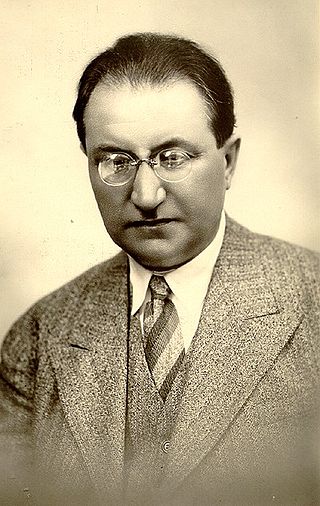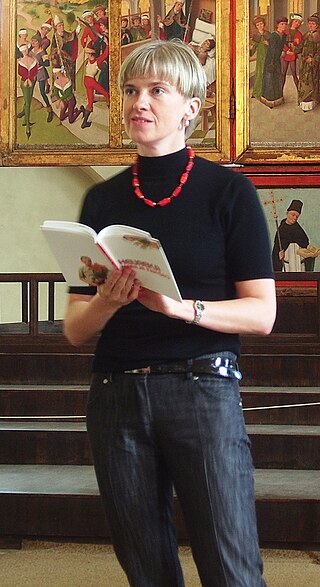This article has multiple issues. Please help improve it or discuss these issues on the talk page . (Learn how and when to remove these template messages)
|
Estonian Poetry is poetry written in the Estonian language or in Estonia.
This article has multiple issues. Please help improve it or discuss these issues on the talk page . (Learn how and when to remove these template messages)
|
Estonian Poetry is poetry written in the Estonian language or in Estonia.

The earliest known poetry written in Estonia was in the Latin language. The first poems written in the Estonian language came from Baltic German estophiles. The development of Estonian poetry occurred during the time of the Noor-Eesti ("Young Estonia") movement. [1]
Kristjan Jaak Peterson (1801-1822) is commonly regarded as one of the founders of Estonian poetry. [2] Following him, the heyday of national romantic poetry took over as the most prominent examples of Estonian poetry led by poets like Lydia Koidula. [3]
Estonian is a Finnic language and the official language of Estonia. It is written in the Latin script, and is the first language of the majority of the country's population; it is also an official language of the European Union. Estonian is spoken natively by about 1.1 million people; 922,000 people in Estonia, and 160,000 elsewhere.
Estonian orthography is the system used for writing the Estonian language and is based on the Latin alphabet. The Estonian orthography is generally guided by phonemic principles, with each grapheme corresponding to one phoneme.
Juhan Viiding, also known under the pseudonym of Jüri Üdi was an Estonian poet and actor.

Gustav Suits is considered one of the greatest Estonian poets. He was also an early leader of the literary movement group Noor-Eesti.

Bowes & Bowes was a bookselling and publishing company based in Cambridge, England. It was established by Robert Bowes (1835–1919), a nephew of Daniel Macmillan (1813–1857) — the founder, with his brother Alexander, in 1843, of a firm which by 1850 was a thriving bookshop with the official name ‘Macmillan & Co.’ The same bookshop was eventually owned by Alexander Macmillan in partnership with Robert Bowes. The company became known as ‘Bowes & Bowes’ only in 1907, George Brimley Bowes having become a partner in the business in 1899. The firm continued as a family business until 1953 when it was acquired by W H Smith, who continued to operate it under the original name until 1986. In that year the business’s name was changed to Sherratt & Hughes.
Nationality words link to articles with information on the nation's poetry or literature.
Manchester University Press is the university press of the University of Manchester, England and a publisher of academic books and journals. Manchester University Press has developed into an international publisher. It maintains its links with the University.

Tõnu Õnnepalu, also known by the pen names Emil Tode and Anton Nigov, is an Estonian poet, author and translator.
Ilmar Laaban, was an Estonian poet and literary critic.
Estonian literature is literature written in the Estonian language The domination of Estonia after the Northern Crusades, from the 13th century to 1918 by Germany, Sweden, and Russia resulted in few early written literary works in the Estonian language. The oldest records of written Estonian date from the 13th century. Originates Livoniae in Chronicle of Henry of Livonia contains Estonian place names, words and fragments of sentences. The Liber Census Daniae (1241) contains Estonian place and family names. The earliest extant samples of connected Estonian are the so-called Kullamaa prayers dating from 1524 and 1528. The first known printed book is a bilingual German-Estonian translation of the Lutheran catechism by S.Wanradt and J. Koell (1535). For the use of priests an Estonian grammar was printed in German in 1637. The New Testament was translated into southern Estonian in 1686. The two dialects were united by Anton Thor Helle in a form based on northern Estonian. Writings in Estonian became more significant in the 19th century during the Estophile Enlightenment Period (1750–1840).

Villem Grünthal-Ridala, born Wilhelm Grünthal was an Estonian poet, translator, linguist and folklorist.

Karl Martin Sinijärv is an Estonian journalist and poet.

Bernard Kangro was an Estonian writer and poet.

Maarja Kangro is an Estonian poet, short story writer, novelist, essayist, nonfiction writer and librettist.

Aapo Ilves is an Estonian poet, writer, playwright, artist and musician. He writes in Estonian, Võro and Seto languages. Ilves has also written song lyrics for other artists, including several "Hits of the Year" and also Estonian Eurovision entries "Tii" in 2004 and Kuula in 2012.
The Japanese haiku has been adopted in various languages other than Japanese.

Kätlin Kaldmaa is an Estonian freelance writer, poet, translator and literary critic. Since 2010, Kaldmaa is the president of the Estonian PEN. In 2016 she was elected Secretary of the PEN International.

Ellen Niit was an Estonian children's writer, poet and translator. Over her lifetime, she penned more than forty books of both prose and poetry for children. She also wrote a number of collections of prose and poetry for adults. Her works have been translated into eighteen languages.
Igbo literature is the spoken and written literature of the Igbo people. Before the advents of writing, Igbos practiced oral literature, folk songs and poetry.
Veronika Kivisilla is an Estonian poet and literary critic, possibly best known for her publications Kallis kalender (2011), Cantus Firmus (2015), Kuni armastus peale tuleb (2018), and Salutatio (2019).